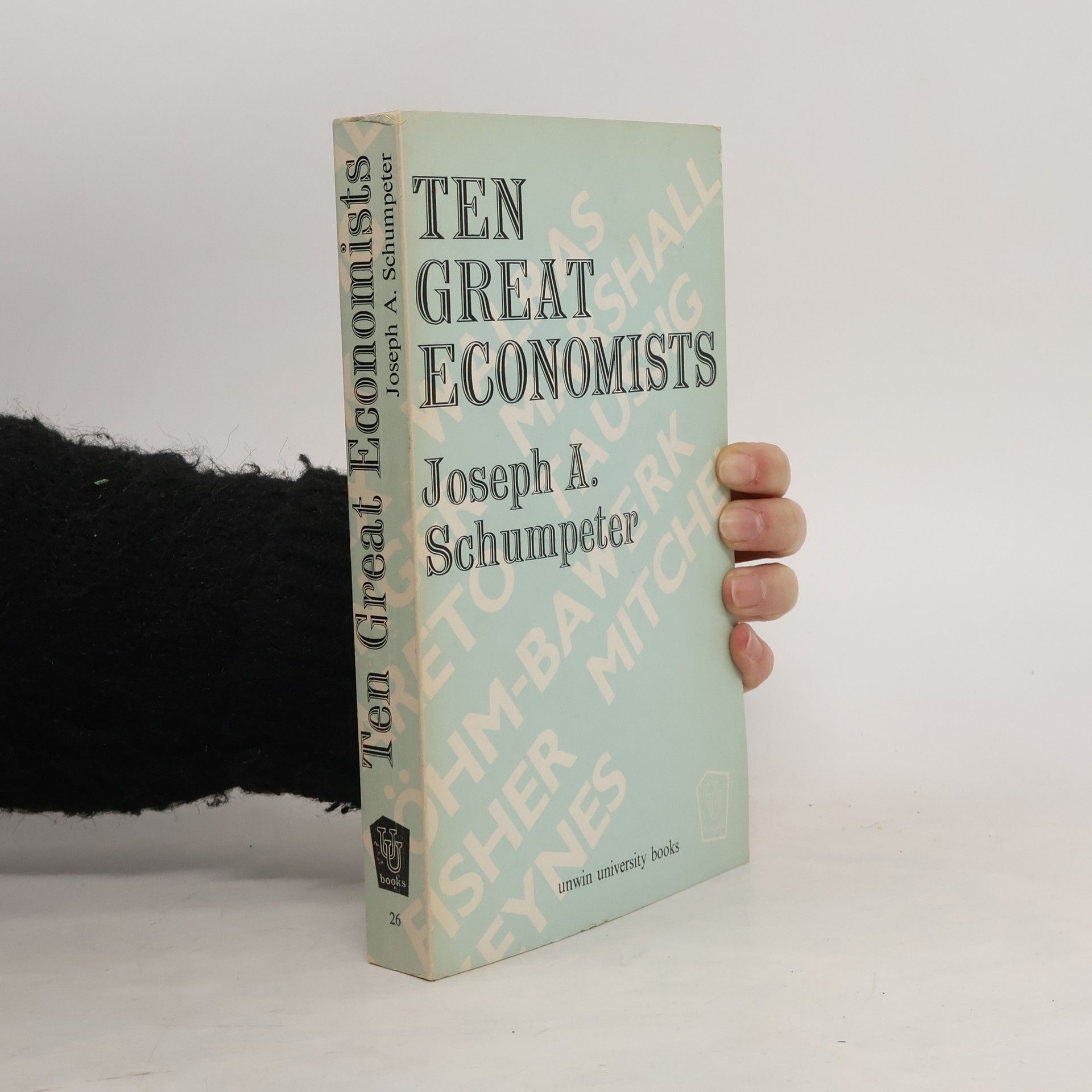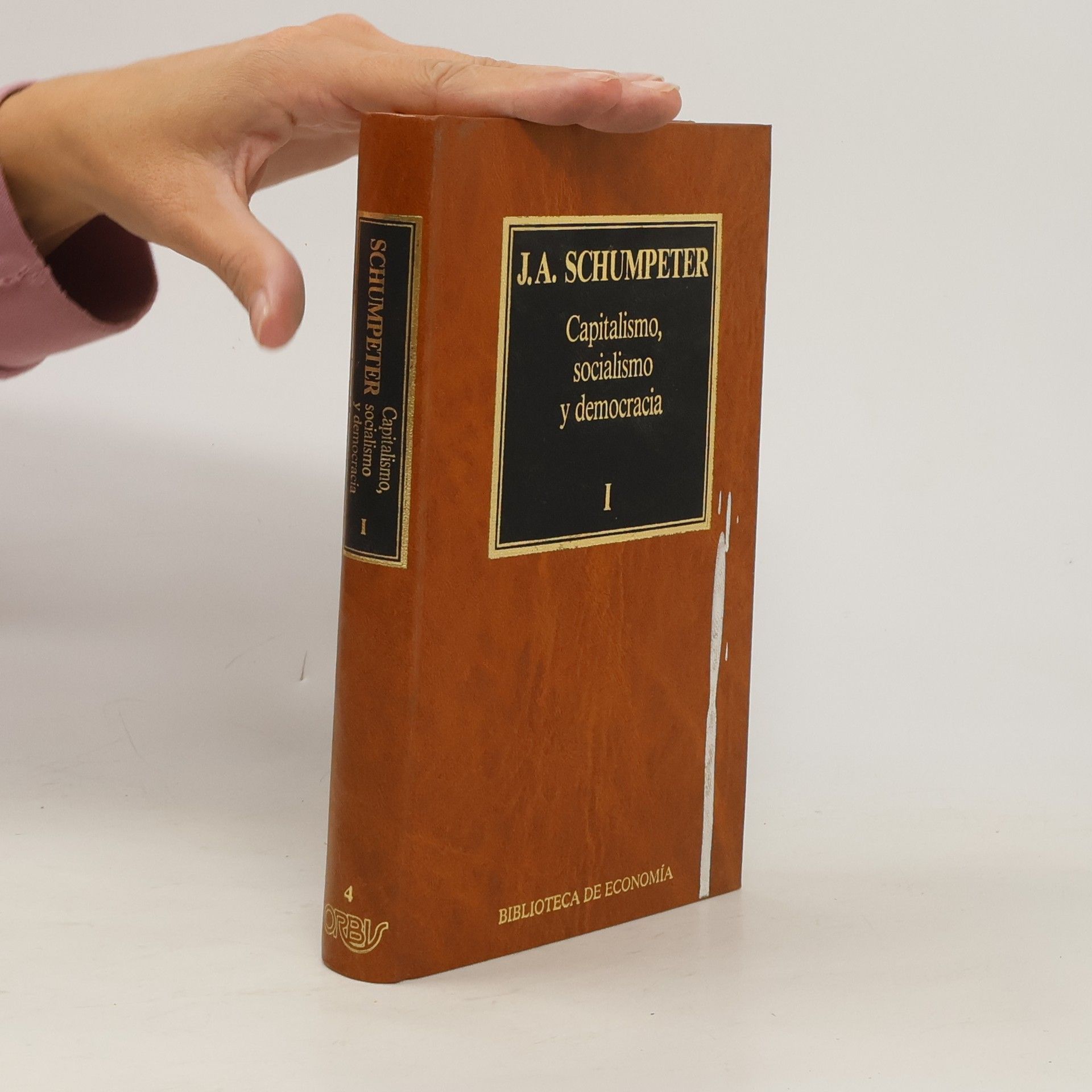Joseph A. Schumpeter Libros
Este economista y politólogo austríaco-estadounidense se hizo famoso por su concepto de "destrucción creativa", que influyó profundamente en el pensamiento económico del siglo XX. Su obra profundizó en la innovación y la dinámica de los sistemas capitalistas, buscando comprender las fuerzas impulsoras del crecimiento y la transformación económica. Fue una figura clave en la configuración del discurso económico moderno. Sus ideas continúan resonando en el campo.







History of Economic Analysis
- 1312 páginas
- 46 horas de lectura
At the time of his death in 1950, Joseph Schumpeter was working on his monumantal History of Economic Analysis. Unprecedented in scope, the book was to provide a complete history of economic theory from Ancient Greece to the end of the second world war. A major contribution to the history of ideas as well as to economics, History of Economic Analysis rapidly gained a reputation as a unique and classic work. As well being an economist, Schumpeter was a gifted mathematician, historian, philosopher and psychologist and this is reflected in the multi-disciplinary nature of his great endeavour. Topics addressed include the techniques of economic analysis, contemporaneous developments in other sciences and the sociology of economics. This inclusiveness extends to the periods and individuals who figure in the book. As well as dealing with all of the major economists from Adam Smith to Maynard Keynes, the book considers the economic writings of Plato and Aristotle, of the Medieval Scholastics and of the major European economists. Throughout, Schumpeter perceived economics as a human science and this is reflected in a volume which is lucid and insightful throughout.
Joseph Schumpeter (1883-1950) is a pivotal figure in twentieth-century economics, celebrated for his unconventional insights into capitalism. His notable students include prominent economists like Paul Samuelson, Robert Solow, and Alan Greenspan. In one of his seminal works, Schumpeter addresses a critical question: why does economic development occur in cycles rather than steadily? He challenges the traditional equilibrium perspective, asserting that economics is perpetually reshaped by internal forces. These forces encompass the 'circular flow' of economic activity, the disruptions and innovations that characterize development, and the driving factors of capitalism, such as credit, profit, and interest. Schumpeter's exploration of these dynamics leads to his influential concept of the business cycle, which is now a staple in economics and business education. He was also the first to position the entrepreneur at the core of capitalism, foreshadowing the later emphasis on entrepreneurship in business literature. Additionally, he introduces the idea of 'creative destruction,' highlighting the radical changes inherent in economic evolution. This work remains a crucial and authoritative examination of economics and capitalism, with insights that continue to resonate today. The Routledge Classics edition features a new Introduction by Richard Swedberg.
Can Capitalism Survive?
- 195 páginas
- 7 horas de lectura
Considered by many economists to be the finest analysis of capitalism ever written, Can Capitalism Survive? introduces Joseph A. Schumpeter's theory of "creative destruction," stating that in capitalist economies new innovations erode the position of established firms while also providing new and previously unforeseen avenues of economic growth. Today the effects of such advancements as Mp3s—replacing CDs, which in turn had replaced cassettes and vinyl records—have proven his ideas correct. Prophetically arguing that capitalist societies are also subject to "perennial gales" of destruction that wipe away fortunes, this great economist revealed the vast, often chaotic economic landscape of world capitalism. First published in Schumpeter's classic Capitalism, Socialism and Democracy, here is an invaluable guide the global economy.
Capitalism, Socialism and Democracy remains one of the greatest works of social theory written in the twentieth Century. Schumpeter's contention that the seeds of capitalism's decline were internal, and his equal and opposite hostility to centralist socialism have perplexed, engaged and infuriated readers since the book's first publication in 1943. By refusing to become an advocate for either position, Schumpeter was able both to make his own great and original contribution and to clear the way for a more balanced consideration of the most important social movements of his and our time.
Capitalism, Socialism, and Democracy (Second Edition Text)
- 428 páginas
- 15 horas de lectura
Schumpeter's "Capitalism, Socialism, and Democracy" is a seminal work synthesizing nearly forty years of thought on socialism and its relationship with democracy. The book explores five central themes, offering a unique analysis while reflecting the author's extensive research and insights into these political and economic systems.
Exploring the concept of "creative destruction," Schumpeter delves into how capitalism evolves and transforms economies through innovation and competition. He examines the interplay between capitalism, socialism, and democracy, offering insights into their dynamics and implications for globalization. This classic work provides a foundational understanding of economic systems and their impact on society, making it essential reading for those interested in economic theory and political philosophy.
Theorie der wirtschaftlichen Entwicklung
Nachdruck der 1. Auflage von 1912. Hrsg. und erg. um eine Einführung von Jochen Röpke - Olaf Stiller.
Fünfundneunzig Jahre nach der ersten Auflage von Schumpeters „Theorie der wirtschaftlichen Entwicklung“ wird die „Urauflage“ in einem Nachdruck mit einer Einführung der Marburger Ökonomen Jochen Röpke und Olaf Stiller präsentiert. Leser haben nun die Möglichkeit, die ungekürzte, 548 Seiten umfassende erste Auflage zu studieren, was eine neue Perspektive auf diesen volkswirtschaftlichen Klassiker eröffnet. Während spätere, theoretisch „entschärfte“ Auflagen für Ökonomen herausfordernd waren, bietet die ursprüngliche Fassung radikale und weitsichtige Überlegungen, die in der Entwicklungs- und Evolutionsökonomik bis heute unerreicht sind. Besonders das zweite Kapitel, „Das Grundphänomen der wirtschaftlichen Entwicklung“, und das unbekannte siebente Kapitel, „Das Gesamtbild der Volkswirtschaft“, bereichern die heutige wissenschaftliche Diskussion und liefern praktische Orientierung für Politik und Wirtschaft. Schumpeters Forderung nach einer neuen wissenschaftlichen Methode ist für die moderne Ökonomie und die Steuerung komplexer Innovationssysteme von zentraler Bedeutung. Seine konsistente Entwicklungstheorie, die über die „Neoklassik“ hinausgeht, bietet Antworten auf Entwicklungs- und Wachstumsvorgänge in verschiedenen Epochen. Diese Neuauflage eröffnet Fachleuten und Interessierten neue Einsichten in das frühe Denken eines Theoriegenies und liefert frische Argumente jenseits der aktuellen politischen Diskussion.

